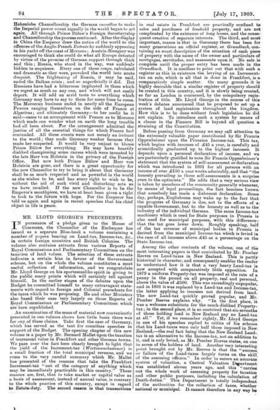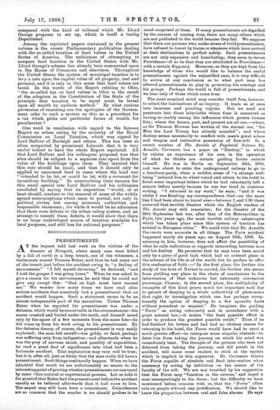MR. LLOYD GEORGE'S PRECEDENTS.
TNpursuance of a pledge given to-the House of Commons, the Chancellor of the Exchequer has issued, as a separate Blue-book a volume containing a number of papers bearing on Land-tax. Income-tax, &c., in certain foreign countries and British Colonies. The volume also contains extracts from various Reports of Royal Commissions and Parliamentary Committees on the taxation of land values. The selection of these extracts indicates a certain bias in favour of the Government scheme, but on the whole the volume constitutes a most useful collection of information, and we congratulate Mr. Lloyd George on his sportsmanlike spirit in giving to the public many. points which will certainly tell against himself. In the earlier stages of the debates upon the Budget he committed himself to many extravagant state- ments with regard to foreign and Colonial precedents for the taxes which he was proposing. He and other Ministers also based their case very largely on those Reports of Royal Commissions or Parliamentary Committees which are here republished.
An examination of the mass of material now conveniently presented in one volume shows how little basis there was for any,of these claims. Take first the case of Germany, which has served as the text for countless speeches in support of the Budget. The opening chapter of this new volume is a paper by Mr. Bernard Mallet upon the taxation of increment value in Frankfort and other German towns. We pass over the fact here clearly brought to light that the yield of the Increment-tax (Wertzuwachssteuer) is a small fraction of the total municipal revenue, and we come to the very careful summary which Mr. Mallet has 'presented of the reasons that take the Frankfort Increment-tax "out of the category of anything which may be immediately practicable in this country.' These reasons are, first, that to take market or capital value as a basis of assessment, instead of annual value, is contrary to the whole practice of this country, except in regard to Estate-duty. The second reason is that transactions in real estate in Frankfort are practically confined to sales and purchases of freehold property, and are net' complicated by the existence of long leases, and the cease-' quent creation of separate interests. The third, and most important, reason is that in Germany there has been for many generations an official register, or Grundbuch, con- taining an exact description of the situation of each piece of property with the name of the owner and particulars of mortgages, servitudes, and easements upon it. No sale is complete until the proper entry has been made in the Grundbuch. It is needless to point out that with such a register as this in existence the levying of an Increment- tax on sale, which is all that is done in Frankfort, ia a comparatively simple matter. On . many grounds, it is highly desirable that a similar register of property should be created in this country, and it is slowly being created, so far as London is concerned, by the compulsory regis- tration of title. Mr. Lloyd George in the course of this' week's debates announced that he proposed to set up a system of land registration throughout the kingdom. How this is to be done without fresh legislation he did not explain. To introduce such a system by means of a clause in the Finance Bill is beyond all question a straining of the Constitution.
Before passing from Germany we may call attention :to the extremely valuable paper contributed by Sir Francis Oppenheimer upon the Prussian Income-tax. This tax, which begins with incomes of £45 a year, is carefully and scientifically graduated up to the highest incomes. It depends upon a personal declaration of income, and we are particularly gratified to note Sir Francis Oppenheimer's statement that the system of self-assessment or declaration which was introduced in 1891 for all persons with an income of over £150 a year works admirably, and that "the honesty prevailing in these self-assessments is a surprise even to the optimists." He adds that a very serious view is taken by members of the community generally whenever,' by means of legal proceedings, the fact becomes known' that somebody has made a dishonest declaration. Some day, perhaps, Englishmen may wake up to the fact that the progress of Germany is due, not to the efforts of ai capable Government, but to the honesty as well as to the industry of the individual German. The same Income-tax' machinery which is used for State purposes in Prussia is also used for municipal purposes, with this difference:' that the tax goes lower down. Roughly speaking, half of the tax revenue of municipal bodies in Prussia is derived from the municipal Income-tax which is levied ia the case of all incomes above £45 as a percentage on the State Income-tax.
Among the other contents of the volume, one of the most interesting papers is that contributed by Mr. Pember Reeves on Laud-taxes in New Zealand. This is partly - historical in character, and consequently enables the reader to understand how it is that a very heavy Land-tax is now accepted with comparatively little opposition. In 1879 a uniform Property-tax was imposed at the rate of a. penny in the pound. on all property, real and personal, above the value of £500. This was exceedingly unpopular, and in 1891 it was replaced by a Land-tax and Income-tax, the latter applying to incomes not derived from land. The new Land-tax quickly proved popular, and Mr. Pember Reeves explains why. "In the first place, it was a welcome substitute for the much-disliked Property- tax ; in the second place, it is so contrived that six-sevenths of those holding land in New Zealand pay no Land-tax at all." Yet, if we remember rightly, Mr. Lloyd George in one of his speeches replied to critics of his scheme that his Land-taxes were only half those imposed in New.. Zealand,—the real fact being that the New Zealand Land-, tax is an alternative to the Income-tax not an addition to it, and is only levied, as Mr. Peniber Reeves states, on one, in seven of the holders of land. Another very interesting, point brought out by Mr. Reeves is that the "success or failure of the Land-taxes largely turns on, the skill: of the assessing officers." In order to secure an accurate' system of valuation, a Central Valuation Department was established eleven years ago, and this ", carries out the whole work of assessing property for taxation and other public purposes, including the-calculation of Death-duties." This Department is totally independent of the authorities for the collection of taxes, whether national or municipal. It cannot therefore in any way be
compared. .with the kind of tribunal which Mr. Lloyd. George proposes to set up, which is itself a taxing Department: 'Among the reprinted papers contained in the present volume is the recent Parliamentary publication dealing with the so-called taxation of land values in the United States of America. The unfairness of attempting to compare land taxation in the United States with Mr. Lloyd George's scheme has already been commented upon in the House of Commons and elsewhere. Throughout the United States the system of municipal taxation is to levy a. rate upon the capital value of all property, real and personal, and it is.only in this sense that land values are taxed. In the words of the Report relating to Ohio, " the so-called tax on land values in Ohio is the result of the adoption in the Constitution of the State of the principle that taxation to be equal must be levied upon all wealth by uniform method." By what curious perversion of reasoning can the apologists of the Govern- ment refer to such a system as this as a precedent for a tax _which picks out particular forms of wealth for penalisation ?
One word in conclusion with regard to the famous Report on urban rating by the minority of the Royal Commission on Local Taxation, which was signed by Lord Balfour of Burleigh and others. This has been so often misquoted by prominent Liberals that it is very useful, indeed to have the whole Report reprinted. All that Lord Balfour and his colleagues proposed was that sites should be subject to a separate rate apart from the value of the buildings upon them. They insisted that tbis rate should be small, and that it should only be applied to uncovered laud in cases where the land was "intended to be let, or could be let, with a covenant for immediate building." In summarising their reasons for this small special rate Lord Balfour and his colleagues concluded by saving that its imposition "would, or at least should, conduce to the removal of some of the widely spread misconceptions which seem to prevail, not only in political circles, but among economic authorities and responsible statesmen ; for while it would be an admission that there were defects in the urban rating system, and an attempt to remedy these defects, it would show that there is no large undeveloped source of taxation available for local purposes, and still less for national purposes." .









































 Previous page
Previous page